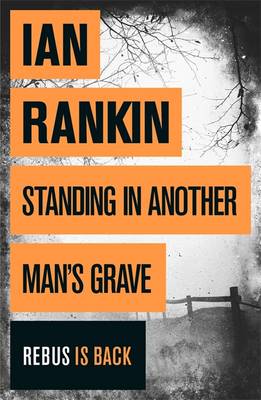
EURO CRIME
Reviews

Rankin, Ian - 'Standing in Another Man's Grave'
Hardback: 352 pages (Nov. 2012) Publisher: Orion ISBN: 1409144712
John Rebus, retired DCI from the Edinburgh police and also (supposedly!) retired after being in about 18 previous novels, is now a civilian attached to a unit investigating cold cases. Not much of interest crops up, and indeed the unit is soon to be closed to make way for a grander initiative. By chance, however, Rebus is the only member of staff in on the day that a woman appears at the station with a lead. Her daughter had vanished many years ago, never to be found. She believes that her daughter's disappearance is connected with other young women who have gone missing in a remote area along the A9 in the north, though the police do not share her conviction. Because she has seen on the news that another girl has now disappeared in the same area, she has come to remind the police of her theory.
Despite initial scepticism, Rebus begins to look into the case by requesting the old records concerning the missing women. Soon, he believes that there may be a connection and contacts his old partner, Siobhan Clarke (now a DCI) who is in the missing persons department investigating the new disappearance. Rebus manages to get himself temporarily attached to the department to help with the case.
The main part of the novel concerns the investigation, as leads run out but Rebus stubbornly keeps going, increasingly in an unofficial capacity as the police management runs out of patience with his old-fashioned ways. Clarke is torn between her admiration for Rebus's approach and her own career in the new-style, corporate police force, having to decide whether to help her old mentor and at what cost to herself.
Rebus is the quintessential loner, with no friends, living off takeaway food, listening to music and smoking too much. His obsession with the case is partly fuelled by his lack of having anything else in his life: he drives up and down the roads of northern Scotland seeking out people who can help him with some of the meagre clues that exist about the missing girls. A small glimpse into his personal life is poignantly presented.
Although the main part of the book is a fairly slow but dryly humorous account of the thankless tasks of the minutiae of "on the ground" police work, there are several subplots that are cleverly dovetailed into the main narrative, most of them involving three very different men involved in organised crime, and a couple of them involving leads that appear irrelevant but which turn out to be very much part of the picture in unusual ways. Rebus himself is a great, mature character, confidently portrayed and complete in himself - not least in his particular style of insubordination while appearing to comply. My only quibble is with the eventual identification of the presumed abductor - this person seems somewhat plucked out of the air and is given neither motive nor much character. But perhaps this is the nature of real crime, rather than the glamourised fictional version with which we are often presented. And Ian Rankin is to be congratulated on writing a novel that tells a good, involving story, rather than one that relies on sensation for its own sake or inventively described methods of murder.
Maxine Clarke, England
November 2012
Details of the author's other books with links to reviews can be found on the Books page.
More European crime fiction reviews can be found on the Reviews page.